Text
Celebrate the potential of every girl, including migrant girls, to achieve their dreams.
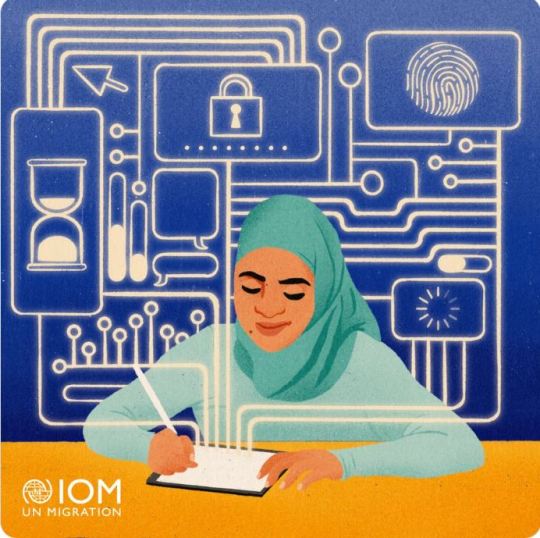
Today and every day, we celebrate the potential of every girl, including migrant girls, to achieve their dreams, change the world, and make a difference.
0 notes
Text
By 2030, over 340 million women and girls will be living on less than $2.15 a day.
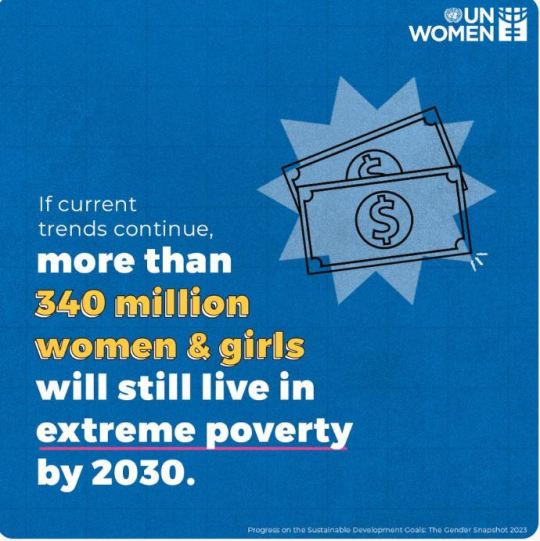
If current trends continues, more than 400 million women & girls will still live in extreme poverty by 2030. Most of them will be in sub-Saharan Africa.
0 notes
Text
State of the World's Girls -Key findings.
Girls and young Girls and young women surveyed said:
"Despite the hurdles put in their way most of the adolescent girl and young women activists were determined to continue with their activism and saw it as a life’s work."

#international day of the girl child#adolescent girls#girl child#State of the World's Girls#girls activists#girl and youth led groups#girls rights
0 notes
Text
Support girls’ and young women’s collective action and recognise
their value and role as civil society actors.
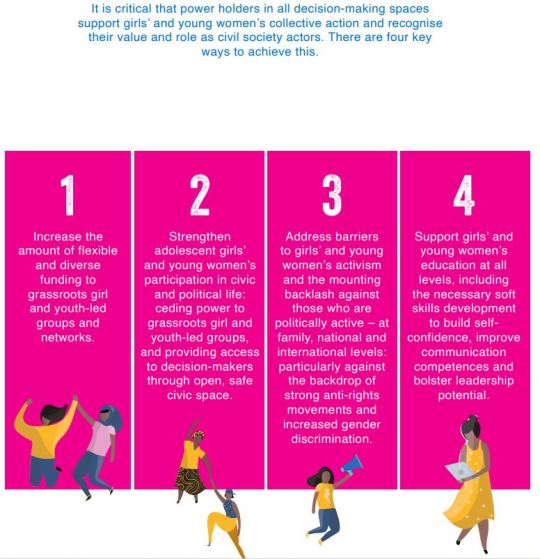
It is critical that power holders in all decision-making spaces
support girls’ and young women’s collective action and recognise
their value and role as civil society actors. There are four key
ways to achieve this;
1 - Increase the amount of flexible and diverse funding to grassroots girl and youth-led groups and networks.
2 - Strengthen adolescent girls’ and young women’s participation in civic and political life: ceding power to grassroots girl and youth-led groups, and providing access to decision-makers through open, safe
civic space.
3 - Address barriers to girls’ and young women’s activism and the mounting backlash against those who are politically active – at
family, national and international levels: particularly against the backdrop of strong anti-rights movements and increased gender
discrimination.
4 - Support girls’ and young women’s education at all levels, including the necessary soft skills development to build self-confidence, improve communication competences and bolster leadership potential.
#girl and youth led groups#girl empowerment#girls rights#adolescent girls#leadership#safety of girl led group#civil society#international day of the girl child#11 october#state of the world's girls
0 notes
Text
Provide financial resources and non-financial support.

Government donors, philanthropists, funding bodies and civil society organisations must:
- Increase the provision of flexible and responsive funding to girl- and youth-led groups, organisations, and networks to support their work: incorporating seed and other types of flexible funding and including small grants and long-term financing, that is responsive to their priorities and the contexts they operate in. Multi-year flexible grants should be made available to reduce fundraising burdens and allow
youth groups to adjust programmatic priorities and to respond to changing environments.
- Provide non-financial support in line with girls’ needs. This could include girl and youth-centred capacity strengthening, access to mentoring and network building opportunities, access to decisionmakers and influencing spaces, safety and security and mental health and wellbeing support, and physical assets such as office space.
- Re-assess risk appetites to shift more power to and trust in young people. Including by removing any bureaucratic barriers that prevent girl activists and young women-led groups from accessing funding
and other non-financial support. Where adapting practices to increase direct funding will take time, donors should be open to testing different modalities for shifting money and working with others, includingfeminist and/or youth-friendly intermediaries, to
find solutions to provide financial and non-financial support to girl-and-youth-led organisations and networks. Especially where they are unregistered or cannot meet donor pre-conditions such as having
bank accounts.
- Provide financial resources through more inclusive and participatory grant-making processes codesigned with girls. Girls need to be at the heart of setting donor priorities, and of decision-making, concerning the distribution of funds. Funders should
adopt more youth-friendly applications and reporting processes, reducing the administrative and reporting burden: freeing up young people’s, often volunteers’, time will expand their capacity for undertaking advocacy activities.
- Provide fair and adequate compensation. Organisations working with girls and young people need to pay for their time and expertise. Donors, who are often responsible for setting ceilings for
compensation, must do so in a way that is genderresponsive and reflective of the local economic climate taking into consideration cost of living and rates of inflation. Civil society and NGOs should
also provide reasonable support, including financial compensation, to young people who are engaged intheir activities.
#financial resources#girls rights#financial responsibility#civil society#Government donors#philanthropists#funding bodies#international day of the girl child#adolescent girls#girl and youth led groups#girls activists
1 note
·
View note
Text
Strengthen the meaningful engagement of girls and young women in all areas of public life, facilitating access to decision-makers.
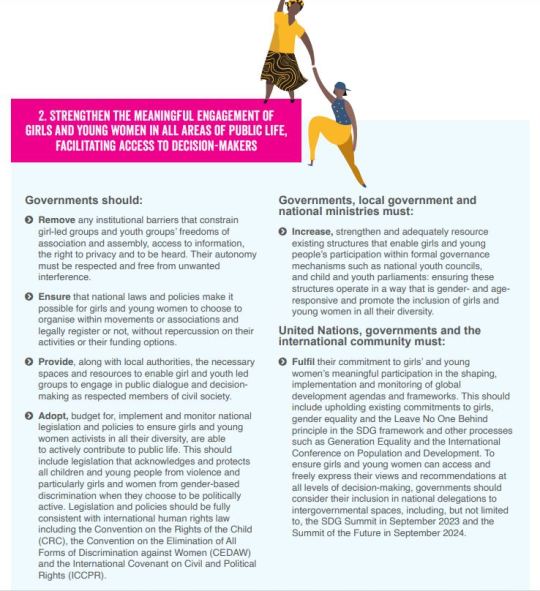
Governments should:
- Remove any institutional barriers that constrain girl-led groups and youth groups’ freedoms of association and assembly, access to information, the right to privacy and to be heard. Their autonomy
must be respected and free from unwanted interference.
- Ensure that national laws and policies make it possible for girls and young women to choose to organise within movements or associations and legally register or not, without repercussion on their
activities or their funding options.
- Provide, along with local authorities, the necessary spaces and resources to enable girl and youth led groups to engage in public dialogue and decision-making as respected members of civil society.
- Adopt, budget for, implement and monitor national legislation and policies to ensure girls and young women activists in all their diversity, are able to actively contribute to public life. This should
include legislation that acknowledges and protects all children and young people from violence and particularly girls and women from gender-based discrimination when they choose to be politically
active. Legislation and policies should be full consistent with international human rights law including the Convention on the Rights of the Child (CRC), the Convention on the Elimination of All
Forms of Discrimination against Women (CEDAW) and the International Covenant on Civil and Political Rights (ICCPR).
Governments, local government and national ministries must:
- Increase, strengthen and adequately resource existing structures that enable girls and young people’s participation within formal governance mechanisms such as national youth councils,
and child and youth parliaments: ensuring these structures operate in a way that is gender- and ageresponsive and promote the inclusion of girls and young women in all their diversity.
United Nations, governments and the international community must:
- Fulfil their commitment to girls’ and young women’s meaningful participation in the shaping, implementation and monitoring of global development agendas and frameworks. This should
include upholding existing commitments to girls, gender equality and the Leave No One Behind principle in the SDG framework and other processes such as Generation Equality and the International Conference on Population and Development. To ensure girls and young women can access and freely express their views and recommendations at all levels of decision-making, governments should consider their inclusion in national delegations to intergovernmental spaces, including, but not limited to, the SDG Summit in September 2023 and the Summit of the Future in September 2024.
#girl and youth led groups#decisionmaking#innovation for equality#international day of the girl child#adolescent girls#dayofthegirl#SDG Summit#Summit of the Future#Leave No One Behind#local government#national ministries#Convention on the Rights of the Child (CRC)#Convention on the elimination of all Forms of Discrimination against Women (CEDAW)#International Covenant on Civil and Political Rights (ICCPR)#State of the World's girls
0 notes
Text
Address barriers to girls' and young women's activism and the mounting blacklash agianst those who politically active.

Governments should:
- Ensure girls and young women activists can speak
out without fear of threats, harassment or violence, both online and in public spaces through social norms change campaigns, enforced laws and policies, and strengthened reporting mechanisms.
Girls’ networks and youth groups should have the freedom to speak out and engage in protests without fear of interference from government authorities, the military and local law enforcement.
Government policy makers and social media companies must:
- Take responsibility for creating an open, accessible and safe online civic space for girl and young women activists, providing meaningful connectivity and secure access to the internet. This includes through
the creation of regulatory frameworks for content moderation and by creating stronger, more effective, transparent and accessible reporting mechanismsthat are specific to online gender-based violence and age-related discrimination, that hold perpetrators
to account and are responsive to girls’ needs and experiences.
National, regional and international human rights bodies and governments should:
- Take measures to monitor the specific situation for girl and young women human rights defenders and take appropriate action to protect and empower them.
Governments, donors, NGOs and gender justice movements must:
- Resource and support the wellbeing and safety of girl-led groups who are advocating at the frontlines. Girls need space to process and support their psychosocial health when dealing with the systemic violence and discrimination against them.
This is especially the case for girls advocating in countries where there are conflicts, restrictive civic space and unstable political systems or when they are campaigning on particularly sensitive or taboo issues.
International organisations, including UN bodies, partnerships and INGOs should:
- Invest in and support long term programmes, including mentoring, that provide early opportunities and sustained support for girls and young women who choose to speak out and advocate in their
communities. Where possible, these organisations should work in partnership with women’s rights movements and other grassroots organisations to provide intergenerational support, solidarity, and
mentorship to girl activists.
#safety of girl-led group#dayofthegirl#11 october#international day of the girl child#plan international#state of the world's girls#policy makers#international human rights bodies#girls rights#girl empowerment#non-govermental organizations#gender justice movements
0 notes
Text
Support Girls and young women's education at all levels.

Education Ministries should:
- Ensure the provision of inclusive, quality gender transformative education which includes a focus on human rights and civic education. Equipping all children and youth, particularly girls and young women, with the necessary skills, knowledge, critical
consciousness and experience to feel confident to engage in civic and political life as activists, advocates and informed citizens. This commitment is enshrined in the SDG 4.7 target and governments
should make a point of reporting on progress to implement this as part of their commitment to Leave No One Behind.
School stakeholders (teachers, councils, and parents) must:
- Provide students, especially girls, with opportunities to develop the soft skills integral to influencing, including leadership skills-development, public speaking, and access to decision-making processes within school governance structures, such as school
councils and elections.
INGOs and civil society must:
- Recognise the value of girl and youth activists to affect change and support the development of critical influencing skills: building effective advocacy and the ability to lobby power holders, including how to navigate different policy spaces and influencing processes. Focus should also be given to soft skills development, including leadership, public speaking and self-confidence.
State of the world's girls
#civil society#non governmental organizations#School stakeholders#Education Ministries#international day of the girl child#11 october#dayofthegirl#adolescent girls#specific skills#digital skills#girls education#State of the world's Girls
0 notes
Text
Turning the world around girls and young women activists leading the fight for equality.

The "State of the world's Girls'' research provides a unique insight from over 1,000 participants* into what it’s like to be an adolescent
girl or young women activist in 2023: how are they treated, do they feel safe, what keeps them going?
#international day of the girl child#Plan International#State of the world's Girls#girl child#adolescent girls#gender equality
0 notes
Text
Forcibly displaced women and girls can't be left behind in an increasingly digitized world.
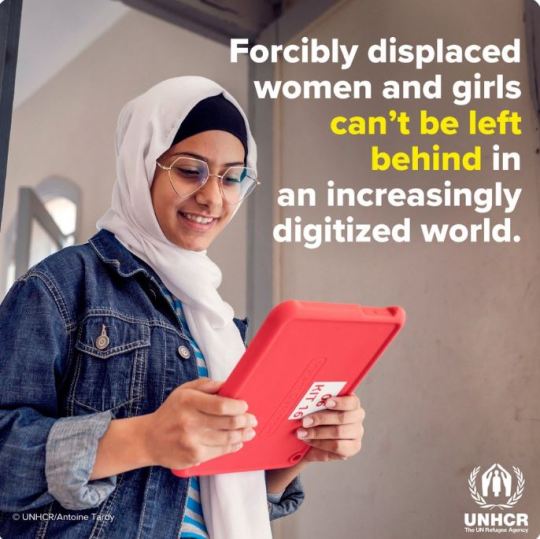
Refugee girls deserve the opportunities to chase their dreams in this digital world. A sustainable future is not possible without them.
Inclusive tech
Digital education
Innovation for equality
#Inclusive tech#Digital education#Innovation for equality#digital access#digital divide#international day of the girl child#dayofthegirl#11 october#unhcr
0 notes
Text
Around the world, girls are: Innovating.

The Digital Skills to Careers Programme helps girls and young women find jobs, launch careers, and support themselves.
Innovation and Technology for Gender Equality.
#adolescent girls#international day of the girl child#dayofthegirl#11 october#digital technology#girl empowerment#innovation#ibbovating#un women
0 notes
Text
Around the world girls are: Learning.

On the #DayOfTheGirl & every day,
0 notes
Text
Around the world, girls are: Leading.

Girls are shattering stereotypes & overcoming gender bias that have long hindered them from realizing their full potential & chasing their dreams.
#leading#dayofthegirl#11 october#girl child#adolescent girls#international day of the girl child#un women
0 notes
Text
Around the world girls are: Teaching.

UN Women supports girls in seizing control of their own futures.
0 notes
Text
Education is a fundamental right.

At the current rate of progress, 110 million girls & young women will remain out of school in 2030. This puts them at a risk of violence, exploitation, and early marriage.
#digital access#gender equality#dayofthegirl#11 october#un women#international day of the girl child#out of school
0 notes
Text
Screening of “Raise the Bar” to mark the International Day of the Girl Child 2023. Ciné-ONU.
To mark the International Day of the Girl Child, the United Nations, the European Week of Action for Girls’ Coalition, the Embassy of Iceland and the European Commission present “Raise the Bar”, by Gudjon Ragnarsson.

In 2015 a basketball team for girls was formed in Iceland. The coach was experienced, unconditional and constantly raised the bar. The girls were trained as leaders off the field and like professional athletes on the field. Early on, they set their goal high, they would always compete with the best team and with that ambition they were victorious in competing in girls’ and boys’ tournaments. Until they no longer were allowed to compete with the boys. This is a story of 8–13-year-old girls, who wanted to change the paradigm in women’s basketball in Iceland. With great sacrifice, they faced the challenges they met.
Monday 9 October 2023 – Register for tickets
19:00 / Cinéma Galeries
Welcoming speech by Kristján Andri Stefánsson, Ambassador to Belgium and Head of Mission of Iceland to the EU.
The film will be followed by a panel discussion, in the presence of:
Michaela Moua, Anti-Racism Coordinator, European Commission
Birgit Van Hout, Director, Representation Office in Brussels, UN Population Fund (UNFPA)
Margrét Jónasdóttir, Producer of “Raise the Bar”
Young Advocates of the European Week of Action for Girls (EWAG) Coalition
Moderated by Sherri Aldis, Director, UNRIC.
The film has a runtime of 70 minutes.
youtube
The event will be followed by a reception, courtesy of the Icelandic Embassy
Click here to register for tickets.
Check-in at the cinema starts at 18:30.
Due to a large number of no-shows, we kindly ask you to register only if you are able to attend our event. As we are forced to overbook, a ticket does not guarantee a seat – please be on time.
NO LATE ADMISSION
*If you do not receive a confirmation of your registration, please first check your spam folder before contacting us at [email protected]
#UNRIC#International Day of the Girl Child#dayofthegirl#adolescent girls#girl child#Raise the Bar#Ciné-ONU#Cinéma Galeries#film screening#films screened#Youtube
0 notes
Text
Let’s redouble our efforts to make sure girls everywhere are healthy, educated and safe.
When girls thrive, we all thrive. Investing in girls, their education & human rights, is investing in our common future.

This #DayoftheGirl, let’s redouble our efforts to make sure girls everywhere are healthy, educated & safe.

0 notes